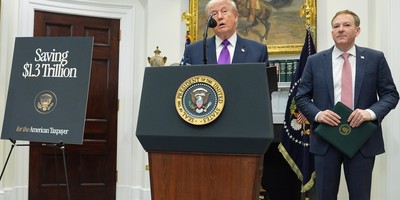Oral arguments for and against Obamacare begin in 10 days in our highest court. Meanwhile, The Hill notices a change in the Obama Administration defense of its signature accomplishment. Instead of focusing on the Commerce Clause, which states that Congress may regulate interstate commerce, the Administration is now arguing that the individual mandate should be upheld under the Necessary and Proper Clause, which states that Congress may enact laws that are necessary to carry out its powers. Although the Administration has made both arguments in previous briefs, the emphasis is decidedly more on the Necessary and Proper Clause than it used to be. Why the change? Some are saying that the Administration is hoping to win over Justice Scalia.
Written briefs in the landmark case increasingly have focused on a part of the Constitution that didn’t get much attention in lower courts.
Some legal experts say the shift could steer the case in a direction that would make Justice Antonin Scalia more likely to uphold the healthcare law’s mandate requiring individuals to purchase health insurance.
Writing at the Volokh Conspiracy, Ilya Somin points out that not only has the Necessary and Proper Clause argument done poorly in lower courts, but the Obama Administration's argument ignores the "Proper" part of the argument, leaving only the "Necessary" half. This is unlikely to impress Justice Scalia.
The federal government has in fact relied on the Necessary and Proper Clause throughout the litigation in the lower courts. So at most this is a shift of emphasis rather than substance. The actual logic of the argument is essentially the same as in the lower courts. And every lower court decision striking down the mandate has in fact considered and rejected the government’s Necessary and Proper Clause reasoning; the lower court decisions upholding the mandate largely ignored the issue because they concluded that the mandate could be justified under the Commerce Clause alone.
If the Obama Administration has decided to emphasize the Necessary and Proper Clause argument more, it is remarkable that their brief for the Supreme Court case almost completely ignores the biggest weakness in that argument: the possibility that the mandate is not “proper” even if it is “necessary.” Both Supreme Court precedent and the text and original meaning of the Constitution make clear that these are two separate requirements, both of which must be met. Yet the government’s approach to the case essentially transforms the Necessary and Proper Clause into the “Necessary Clause.” The amicus brief I wrote on behalf of the Washington Legal Foundation and a group of constitutional law scholars focuses on this very issue. It explains in detail why the mandate is not “proper” and therefore cannot be justified under the Necessary and Proper Clause even if it is “necessary.”

























Join the conversation as a VIP Member